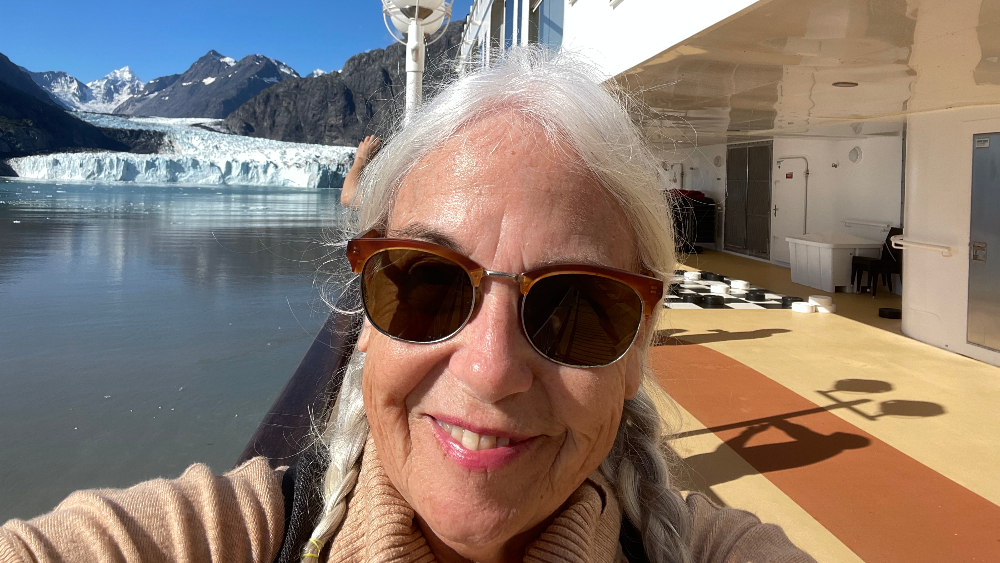Survivor Stories
Lee Eaton
August 2, 2023
Lee Eaton has always made her health a priority. She has followed a plant-based diet her entire life, has never taken any drugs, and practices meditation on a regular basis.
However, Lee also doesn’t go to the doctor very often. She had both of her children at home with a midwife, and she’s never had a cause to go to the hospital for any other reason.
After enrolling in Medicare, her son requested that she see a doctor for a baseline health check. In 2020, she obliged — a decision that may have saved her life.
At this appointment, Lee had a pap smear that came back irregular. But it was 2020, and like many other people around the world, she was about to hunker down at home and limit doctor’s appointments as a result of the COVID-19 pandemic.
Once she safely returned to the doctor in 2022, she had another pap smear, which also came back irregular. Her care team recommended a cone biopsy, which is a procedure where a cone-shaped slice of abnormal tissue is removed from the cervix. Lee’s cone biopsy was completed in July of the same year, and afterward, she was given the news — she had early-stage cervical cancer.
Lee’s cancer diagnosis is what led her to LSU Health, LSU LCMC Health Cancer Center, and the doctors at University Medical Center in New Orleans. Here, she found support from her healthcare providers, courage amidst an overwhelming cancer diagnosis, and purpose as she helped advance treatment for all women facing cervical cancer now and in the future.
Coming to Terms With a Cervical Cancer Diagnosis
As a health-driven woman, Lee never expected to face a major health diagnosis, not to mention one like cancer.
“That word cancer — it’s terrifying,” she says. “A lot of what I did for myself was get in touch with the fear of all that. Nothing in my life came close to the fear reaction that the cancer diagnosis caused.”
After telling her two sons about her diagnosis, they quickly stepped in to support her. One of her sons has two children himself, so he supported his mom from home. Her other son flew to New Orleans to stand by his mom’s side during the toughest of her appointments.
Lee also leaned on the support of her care team. “I have absolutely loved every one of these women,” she says. “I have trusted them to help me. I felt really cared for.”
Through this support — and plenty of meditation — she came to terms with her diagnosis and what she needed to do for her health.
Joining the ROCC Clinical Trial for Radical Hysterectomy
Lee’s cancer treatment plan involved enrolling in a clinical trial called the Robotic Versus Open Radical Hysterectomy Surgery in Cervix Cancer (ROCC) trial. This trial is investigating treating cervical cancer using a radical hysterectomy, a procedure to remove the uterus, cervix, fallopian tubes, ovaries, the upper part of the vagina, and some tissue and lymph nodes.
The ROCC trial is studying the effectiveness of this procedure through two approaches — an open radical hysterectomy (done through a cut in the abdomen) versus a robotic radical hysterectomy (done using instruments that go through tiny abdominal cuts).
For Lee, this trial was an option because her cancer was early-stage. Plus, it offered a less invasive approach that appealed to her.
“Part of joining the trial was self-serving. I wanted the robot, and I had a 50/50 chance of getting it,” she says. “If I didn't join the trial, I had no chance of having the robot.”
Lee was assigned the robotic approach, and her hysterectomy was performed in September 2022. Instead of the extensive recovery that can follow an open surgery, she ended up with just five tiny incisions across her abdomen and a quicker recovery.
Most importantly, Lee’s hysterectomy was a success. After her procedure, no cancer cells were found.
For Lee, deciding to take part in a clinical trial took some consideration, but ultimately felt like the right thing to do.
“Not only did I want it for myself, but I wanted it for other women,” she says. “Maybe the robot will become best practice. That’s the part that makes me feel even better — that I can be part of something that will be helpful to women down the road.”
Getting Care When You Need It
Prior to Lee’s experience, she didn’t go to the doctor regularly. She went from being in charge of her own health to having many sets of eyes on her treatment and recovery.
“Just as Dr. Amelia Jernigan described it to me, not only are the providers at University Medical Center looking at me — and I have total faith in them — all these other researchers with the LSU LCMC Health Cancer Center that are part of the trial are, too,” she says.
Lee knows that the success of her treatment makes her fortunate, but she is also aware that part of that comes down to taking care of herself. It means keeping up with cancer screenings and staying in touch with her health.
It also means letting the experts do what they do best when and if she does need care. “We can help ourselves, and we can allow them to help us because that's what they're there for,” she says.
